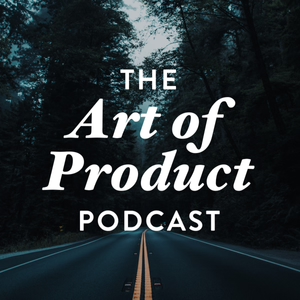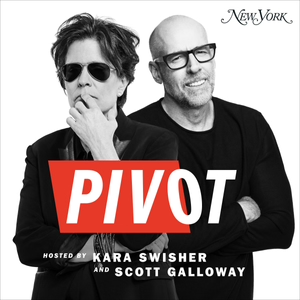
Travis Kalanick's Right-Hand Man Tells the Story of the Coup that Brought Them Down (w/Emil Michael)
07/26/22 • 87 min
This is definitely an episode you’re going to want to listen to.
It’s been a long time coming.
It’s a sequel of sorts to my interview with Bill Gurley that ran a few months after launching this newsletter and my conversation with Dara Khosrowshahi after that.
I finally convinced Emil Michael, a central player in the Uber saga, to give me an on-the-record interview.
Michael was once Travis Kalanick’s top lieutenant. He raised about $15 billion for Uber during his nearly four years at the company. Finally, he came on Dead Cat to talk to Tom Dotan and me. It’s been five years since Kalanick and Michael acrimoniously departed the company they helped build into a juggernaut.
While Michael isn’t Kalanick — who I would love to interview again someday — he was probably the second most important person at Uber during the period, understood the company and Kalanick intimately, and is a lot more willing to publicly reflect on what Uber got right and wrong than his old boss.
We covered a lot of ground in our hour and a half long conversation. Michael didn’t shy away from much.
Whether you’re interested in the inside baseball behind Kalanick’s ouster, or if you want to learn from Uber’s mistakes, or you just want to hear how they raised so much money, you’re going to want to give this episode a listen.
He talked about his infamous visit to a shady Korean karaoke bar that led former U.S. Attorney General Eric Holder to recommend Michael’s dismissal. (In my mind, probably the biggest unreported information from the Kalanick era is the Holder report itself. If anyone ever wants to leak it to me, you know where to find me.)
We discussed the latest media Uber obsession — “The Uber files.” The Guardian and other outlets reported on Uber’s influence campaign in Europe and the “kill switch.” It was a trip down memory lane that helped convince Michael to give his side of the story. Michael quipped about the “kill switch,” Uber’s tactic of locking down computers ahead of government raids: “I do think one of the bad things we did at Uber was naming things terribly.”
Michael inveighed against Benchmark partner Bill Gurley’s crusade to push out Kalanick. But he also reminisced about how he and Gurley used to talk multiple times a day.
Michael criticized current Uber CEO Dara Khosrowshahi’s management of the company, today worth $44.2 billion — about a third less than when Michael helped the company raise at an approximately $70 billion valuation. “When does the buck stop at Dara’s desk?” Michael asked us. But Michael also kicked himself for letting the merger with Lyft slip through his fingers.
We talked about the media coverage of Uber past and present, what the press got right, and what it got wrong. But Michael also admitted that he’d never really figured out how to talk to the press.
Together, we analyzed the Uber TV show, Super Pumped.
Michael engaged with core questions about Uber’s existence: Was the independent contractor model an inescapable original sin? Should investors ever have given Uber so much money? Was the Saudi round that valued Uber at about $70 billion a fair benchmark by which to judge Uber’s current CEO?
Given the many twists and turns of the Uber saga, there’s always more I wish that we’d dug into. We could have dedicated a whole episode to the Susan Fowler saga, for instance. And for every scandal that we examined, there’s another that we left out. Still, I think it’s as in-depth a public reflection...
This is definitely an episode you’re going to want to listen to.
It’s been a long time coming.
It’s a sequel of sorts to my interview with Bill Gurley that ran a few months after launching this newsletter and my conversation with Dara Khosrowshahi after that.
I finally convinced Emil Michael, a central player in the Uber saga, to give me an on-the-record interview.
Michael was once Travis Kalanick’s top lieutenant. He raised about $15 billion for Uber during his nearly four years at the company. Finally, he came on Dead Cat to talk to Tom Dotan and me. It’s been five years since Kalanick and Michael acrimoniously departed the company they helped build into a juggernaut.
While Michael isn’t Kalanick — who I would love to interview again someday — he was probably the second most important person at Uber during the period, understood the company and Kalanick intimately, and is a lot more willing to publicly reflect on what Uber got right and wrong than his old boss.
We covered a lot of ground in our hour and a half long conversation. Michael didn’t shy away from much.
Whether you’re interested in the inside baseball behind Kalanick’s ouster, or if you want to learn from Uber’s mistakes, or you just want to hear how they raised so much money, you’re going to want to give this episode a listen.
He talked about his infamous visit to a shady Korean karaoke bar that led former U.S. Attorney General Eric Holder to recommend Michael’s dismissal. (In my mind, probably the biggest unreported information from the Kalanick era is the Holder report itself. If anyone ever wants to leak it to me, you know where to find me.)
We discussed the latest media Uber obsession — “The Uber files.” The Guardian and other outlets reported on Uber’s influence campaign in Europe and the “kill switch.” It was a trip down memory lane that helped convince Michael to give his side of the story. Michael quipped about the “kill switch,” Uber’s tactic of locking down computers ahead of government raids: “I do think one of the bad things we did at Uber was naming things terribly.”
Michael inveighed against Benchmark partner Bill Gurley’s crusade to push out Kalanick. But he also reminisced about how he and Gurley used to talk multiple times a day.
Michael criticized current Uber CEO Dara Khosrowshahi’s management of the company, today worth $44.2 billion — about a third less than when Michael helped the company raise at an approximately $70 billion valuation. “When does the buck stop at Dara’s desk?” Michael asked us. But Michael also kicked himself for letting the merger with Lyft slip through his fingers.
We talked about the media coverage of Uber past and present, what the press got right, and what it got wrong. But Michael also admitted that he’d never really figured out how to talk to the press.
Together, we analyzed the Uber TV show, Super Pumped.
Michael engaged with core questions about Uber’s existence: Was the independent contractor model an inescapable original sin? Should investors ever have given Uber so much money? Was the Saudi round that valued Uber at about $70 billion a fair benchmark by which to judge Uber’s current CEO?
Given the many twists and turns of the Uber saga, there’s always more I wish that we’d dug into. We could have dedicated a whole episode to the Susan Fowler saga, for instance. And for every scandal that we examined, there’s another that we left out. Still, I think it’s as in-depth a public reflection...
Previous Episode

This Episode Wasn't Sponsored By Techmeme
I’m in Italy right now for my first extended vacation of the year. I spent yesterday bopping around Siena, taking in another beautiful Duomo, eating a sandwich with lardo, and hunting for the frescoes that provided the grist for my girlfriend’s mom’s art history thesis. After stopping in Rome and Florence, my girlfriend and I are staying in rural Tuscany for a friend’s wedding and then are headed to Cinque Terre in a few days.
I’m doing my best to disconnect from the newsletter for these two weeks — though not as much as my girlfriend might like.
I left my podcast co-hosts Tom Dotan and Katie Benner to their own devices with Dead Cat this week. Listening to the episode, they’re clearly feeling a little more pessimistic than I am. Tom proposed for the subject line of this email, “No ideas. No joy. No money” or “the summer of despair.” Both struck me as a little too dour.
In the latest episode of Dead Cat, Tom and Katie take stock of some of the top stories in tech this week via Techmeme headlines: The implosion of Apple’s self-driving car program, the Uber files, and Elon Musk’s fight with Twitter. They ask why tech seems to be stuck in a rut. But mostly they seem to have a fun time, sardonically dissecting the tech world and puzzling out what the latest stock downturn means for our favorite tech storylines. It’s an enjoyable listen if you’ve got some time to kill as vineyards and hay bales pass you by.
Their discussion hinges in part on The Information’s latest reporting on Apple’s self-driving car program. Apple just can’t seem to figure it out.
The Information’s Wayne Ma reported on the perils of demoware:
Engineers waste precious time choreographing demonstrations along specific routes using technology that works there but almost nowhere else, a phenomenon known as demoware. Some people who have worked on Titan say Apple fell harder into the demoware trap than some rivals, despite the fact that an automated car with no steering wheel needs to drive almost perfectly everywhere or few people would feel safe buying one.
“If you spend enough money, you can get almost any fixed route to work,” said Arun Venkatadri, who previously worked on self-driving cars at Uber and now runs Model-Prime, which makes software tools for robotics companies. “But what isn’t shown is whether you can build your self-driving software in a scalable fashion and whether you can operate in a reasonably broad area.”
And if Apple can’t figure it out, who can? Despite constant promises and over-optimistic projections from self-driving car researchers, the driverless cars don’t seem to be coming to the masses anytime soon.
Even while on vacation, I couldn’t help myself from reading Twitter’s lawsuit against Elon Musk. The suit convinced usually skeptical Hindenburg Research to buy Twitter shares, believing that Twitter had a compelling case on its hands.
It’s hard not to feel bad for Twitter. They never wanted Musk to try to buy them in the first place. Then Musk gave them an offer too good to refuse. And since then, he seems to be trying to do everything in his power to further erode Twitter’s value without paying them the premium he agreed to.
Tom and Katie break down the drama on the latest episode.
Give it a listen.
Get full access to Newcomer at www.newcomer.co/subscribe
Next Episode

Freeloaders, Fat cats & Ne'er-do-wells (w/Alex Heath)
Instagram chief Adam Mosseri has been playing defense as Instagram’s product goes on offense.
Mosseri released a video explaining recent changes to Instagram and defended Instagram’s pivot from a friend-oriented, social graph-sorted photo sharing app to a creator-driven, AI-powered content machine.
Meanwhile, the broader Meta employee base has been feeling the pain. CEO Mark Zuckerberg is bringing down the hammer, signaling that the company is trying to manage out weak performers. The company has started a campaign against coasters.
But Meta employees are passing around memes suggesting that Zuckerberg is the coaster-in-chief.
I talked with Verge reporter and social media savant Alex Heath about the turmoil at Facebook on the latest episode of Dead Cat, along with co-hosts Tom Dotan and Katie Benner.
Heath recently recounted a contentious vignette inside a recent Meta all-hands:
“Hi there,” the first prerecorded employee question started. “I’m Gary, and I’m located in Chicago.” His question: would Meta Days — extra days off introduced during the pandemic — continue in 2023?
Zuckerberg appeared visibly frustrated. “Um... all right,” he stammered. He’d just explained that he thought the economy was headed for one of the “worst downturns that we’ve seen in recent history.” He’d already frozen hiring in many areas. TikTok was eating their lunch, and it would take over a year and a half before they had “line of sight” to overtaking it.
And Gary from Chicago was asking about extra vacation days?
“Given my tone in the rest of the Q&A, you can probably imagine what my reaction to this is,” Zuckerberg said. After this year, Meta Days were canceled.
We talk about employee unrest at Meta, Instagram’s strategy shift, the state of the metaverse, and Snap’s oscillating stock price on the episode. At the end of the lively episode, the conversation devolved into an argument about antitrust. We end the podcast a bit abruptly in order to avoid recording Tom’s son dashing into the room. Enjoy.
Give it a listen.
Read the automated transcript.
Get full access to Newcomer at www.newcomer.co/subscribe
If you like this episode you’ll love
Episode Comments
Generate a badge
Get a badge for your website that links back to this episode
<a href="https://goodpods.com/podcasts/newcomer-podcast-218841/travis-kalanicks-right-hand-man-tells-the-story-of-the-coup-that-broug-24845651"> <img src="https://storage.googleapis.com/goodpods-images-bucket/badges/generic-badge-1.svg" alt="listen to travis kalanick's right-hand man tells the story of the coup that brought them down (w/emil michael) on goodpods" style="width: 225px" /> </a>
Copy




